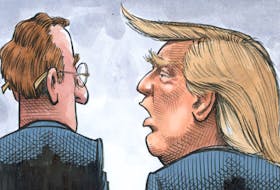It feels like much of the world has become comfortably numb to the urgent pleas of the best and brightest scientists alive for decisive and immediate action to contain catastrophic climate change.
The International Panel on Climate Change (IPCC) released a report Sunday that was unambiguous in its grim findings, despite efforts by government representatives on the panel to tone the scientists down.
UN Secretary General António Guterres called the IPCC report an “ear-splitting wake-up call” that the world must hear and heed and added the ominous warning that we’re running out of time to save the planet as we know it.
A couple of days earlier in Calgary, Ontario’s Tory Premier Doug Ford and Alberta’s United Conservative leader Jason Kenney rallied and railed against all efforts to reduce Canada’s CO2 emissions by taxing them.
The irony, if there is any, is that the IPCC concluded Canada’s current efforts along with those of the other signatories to the Paris Accord aren’t good enough to save low-lying coastal communities, Coral reefs, or tens, perhaps hundreds of millions of people from becoming climate refugees or dying of starvation.
Reductions in greenhouse gases need to be deeper and come faster than established global targets to hold off climate changes that will make the recent uptick in killer storms, wildfires and lethal heat waves seem like the good old days.
Maybe the Conservatives are right and there is a better way to reduce carbon emissions than the Trudeau government’s pricing program. But, if they know what that is, they’re not telling.
RELATED:
- Atlantic Canada is sinking as water levels swell
- As land disappears, governments shore up plans to cope with climate change
- RISING SEAS: High tides threaten low-lying Isthmus of Chignecto
- Fishermen weathering effects of climate change
- Protecting Nova Scotia's coastline: legislation pending, the province said in June
The IPCC said the window of opportunity to keep global warming to a relatively manageable 1.5-degree increase will close by 2030. In order to achieve that ceiling the world has 12 years to cut carbon emissions in half, and then it must get to net zero carbon emissions by 2050.
Scientists on the IPCC want you to understand the differences between global warming that peaks at 1.5-degrees versus the two-degrees Celsius increase the world is headed for now.
At the lower number about 10 per cent of the world’s insects, eight per cent of its plants and four per cent of its animals (includes humans) are endangered or will be eliminated by the loss of more than half their geographic range. If warming reaches two degrees, you can double those numbers.
At the lower number, 10 to 30 per cent of the world vital Coral reefs might survive. The higher number will almost certainly kill them all.
In Canada, the climate change debate has descended into pure partisan politics where its become about taxes or no taxes, rather than what kind of future we’ll leave generations already born and all those to follow.
The federal Liberals and New Democrats support a price, or tax, on carbon. Most Conservatives at the federal and provincial levels oppose any price on carbon and they’re convinced they have a political winner.
The political opponents of carbon pricing are betting that voters will put their pocket books ahead of uncertain future risks that are nothing more than a distant ship, smoke on the horizon.
That choice is a fallacy according to the best science the world has to offer, and the very real evidence Mother Nature is serving up with righteous wrath across the globe already.
The choice is really between paying the price to lower greenhouse gas emissions now or leaving our kids and grandkids a planet that is increasingly dangerous and inhospitable. And, because poor, underdeveloped nations are not equipped to deal with the ravages of climate change, it’s destruction is meted out unequally.
Guterres said Monday the IPCC report demands “urgent and far more ambitious action” than anything contemplated to date.
“This will take unprecedented changes in all aspects of society — especially in key sectors such as land (use and development), energy, industry, buildings, transport and cities,” he said, adding that “we need to end deforestation and plant billions of trees; drastically reduce the use of fossil fuels and phase out coal.”
And to that, climate change deniers and Canadian Conservatives answer, “Your lips move, but I can’t hear what you’re saying.” (With apologies to David Gilmour and Roger Waters for the clumsy lifts.)









